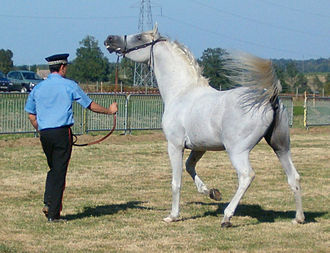Stallion
Stallion refers to a male horse that has not been castrated and is capable of breeding. The term is often associated with horses that have reached the age of four years or older; younger males are typically referred to as colts. Stallions are known for their spirited nature, physical strength, and often, a more muscular build compared to females (mares) and castrated males (geldings). The management and handling of stallions require experienced and careful practices due to their natural instincts and high levels of testosterone, which can influence their temperament and behavior.
Characteristics
Stallions exhibit distinct physical and behavioral characteristics influenced by their role as breeding animals. They have a more pronounced crest compared to mares and geldings, due to the influence of testosterone on muscle development. Stallions are also known for their bold and sometimes aggressive behavior, which can be attributed to their natural instincts to dominate and reproduce. This behavior necessitates specialized management practices to ensure safety and well-being for the stallion and those handling them.
Breeding
In the context of horse breeding, stallions are selected for their genetics, conformation, and performance abilities. They play a crucial role in the propagation of equine breeds and the improvement of equine genetics. Breeding methods include natural cover, where the stallion mates directly with a mare, and artificial insemination, a practice that allows for the broader dissemination of desirable genetics without the need for physical proximity between mare and stallion.
Management
The management of stallions requires careful consideration of their housing, exercise, and socialization needs. Stallions are often kept in individual paddocks or stalls to prevent unwanted breeding and to manage aggressive behaviors towards other horses. Despite their need for separation, it's important for stallions to have visual and limited physical contact with other horses for their mental well-being. Regular exercise and training are crucial to manage their energy levels and maintain their health.
Stallion Behavior
Understanding and managing stallion behavior is critical for those who work with these animals. Training and socialization from a young age can help mitigate some of the more challenging aspects of stallion behavior. Techniques such as positive reinforcement can be effective in teaching stallions to behave appropriately around humans and other horses.
Controversies
The use of stallions in breeding has been a subject of debate, particularly regarding overbreeding and the welfare of the horses involved. Ethical breeding practices are essential to ensure the health and well-being of both stallions and mares in the breeding process.
Conclusion
Stallions play a vital role in the equine world, contributing to the diversity and quality of horse breeds. Their management and care, however, require a deep understanding of equine behavior and experienced handling to ensure the safety and well-being of all involved.
Transform your life with W8MD's budget GLP-1 injections from $125.
W8MD offers a medical weight loss program to lose weight in Philadelphia. Our physician-supervised medical weight loss provides:
- Most insurances accepted or discounted self-pay rates. We will obtain insurance prior authorizations if needed.
- Generic GLP1 weight loss injections from $125 for the starting dose.
- Also offer prescription weight loss medications including Phentermine, Qsymia, Diethylpropion, Contrave etc.
NYC weight loss doctor appointments
Start your NYC weight loss journey today at our NYC medical weight loss and Philadelphia medical weight loss clinics.
- Call 718-946-5500 to lose weight in NYC or for medical weight loss in Philadelphia 215-676-2334.
- Tags:NYC medical weight loss, Philadelphia lose weight Zepbound NYC, Budget GLP1 weight loss injections, Wegovy Philadelphia, Wegovy NYC, Philadelphia medical weight loss, Brookly weight loss and Wegovy NYC
|
WikiMD's Wellness Encyclopedia |
| Let Food Be Thy Medicine Medicine Thy Food - Hippocrates |
Medical Disclaimer: WikiMD is not a substitute for professional medical advice. The information on WikiMD is provided as an information resource only, may be incorrect, outdated or misleading, and is not to be used or relied on for any diagnostic or treatment purposes. Please consult your health care provider before making any healthcare decisions or for guidance about a specific medical condition. WikiMD expressly disclaims responsibility, and shall have no liability, for any damages, loss, injury, or liability whatsoever suffered as a result of your reliance on the information contained in this site. By visiting this site you agree to the foregoing terms and conditions, which may from time to time be changed or supplemented by WikiMD. If you do not agree to the foregoing terms and conditions, you should not enter or use this site. See full disclaimer.
Credits:Most images are courtesy of Wikimedia commons, and templates, categories Wikipedia, licensed under CC BY SA or similar.
Contributors: Prab R. Tumpati, MD






